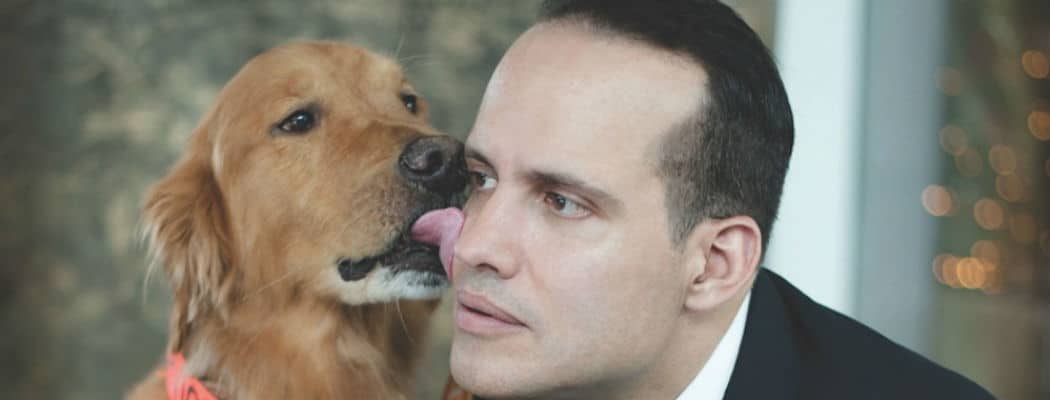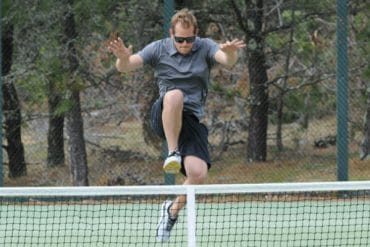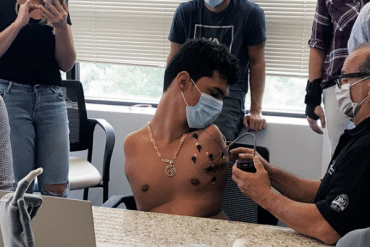Service dogs are helping veterans combat PTSD.
In the wake of the ongoing Global War on Terror, American soldiers have returned home addled with unprecedented rates of PTSD. According to a study released this July by the Department of Veterans Affairs, approximately twenty veterans commit suicide every day in this country. The question of how to best serve our veterans continues to be a difficult one to answer, but a new program championed by Nantucket’s Holidays for Heroes looks to service dogs as a vital ally in the fight.
 This August, Holidays for Heroes launched a campaign to aid wounded warriors by providing them with service dogs specially trained for veterans. Beyond their abilities to aid the disabled in navigating everyday tasks of life, these service dogs are trained to be emotionally in tune with their owners. “The training program of these dogs is so intensive,” says Lynn Walsh, Holidays for Heroes executive director. “It’s like getting a suit tailored on Savile Row in London; the dog is trained specifically for one person’s needs and involves a lot of back and forth between the breeder and the veteran.” Perhaps not surprisingly, each of these canines fetches between $30,000 and $50,000, costs that Holidays for Heroes is looking to offset. But if you ask veterans who depend on these dogs for their very survival, their service is priceless.
This August, Holidays for Heroes launched a campaign to aid wounded warriors by providing them with service dogs specially trained for veterans. Beyond their abilities to aid the disabled in navigating everyday tasks of life, these service dogs are trained to be emotionally in tune with their owners. “The training program of these dogs is so intensive,” says Lynn Walsh, Holidays for Heroes executive director. “It’s like getting a suit tailored on Savile Row in London; the dog is trained specifically for one person’s needs and involves a lot of back and forth between the breeder and the veteran.” Perhaps not surprisingly, each of these canines fetches between $30,000 and $50,000, costs that Holidays for Heroes is looking to offset. But if you ask veterans who depend on these dogs for their very survival, their service is priceless.
“[My dog Tuesday] is trained to… realize when my breathing changes or my pulse quickens, so that he can nudge me with his head until I’ve come out of the memories and back into the present,” writes Luis Carlos Montalvan in his New York Times bestseller, Until Tuesday. “He is my barrier against crowds, my distraction from anxiety, and my assistant in every day tasks.” During his two tours in Iraq as a highly decorated officer, Montalvan’s fearlessness and valor earned him the nickname “The Terminator.” But when he returned to the States after suffering severe physical and mental traumas during combat, Montalvan struggled to even leave the confines of his home. “Before Tuesday, I caught glimpses of snipers on rooftops. Before Tuesday, I spent more than an hour in my apartment working up the courage to walk half a block to the liquor store.”
Today, Montalvan is an advocate and spokesman for the effectiveness of service dogs for vets. This August, he joined Holidays for Heroes in their effort to connect servicemen with ten service dogs by 2017. Montalvan explained that despite the dramatic benefits service dogs have been shown to bring to combat veterans, there have been no steps made by the government to support them. Compounding the typical bureaucratic hindrances, Montalvan said that the use of service dogs has only recently been vetted as a legitimate treatment for PTSD. Nevertheless, he says “it’s been frustrating that both public and private sectors haven’t poured the type of energy and resources needed to hurry up on this matter, particularly with the [suicide pandemic] facing American veterans.”
 And that’s where Holidays for Heroes comes in. “What we’re looking to do is be a streamline function that ties donors and veterans and the service dog providers,” explains BJ Ganum, the H4H Service Dog for Heroes program manager. “We want to make the process of accessing these highly-trained service dogs seamless so that these heroes can work to build their life after the military with a teammate who has their back, just as they had when they served.” Ganum, who served as a marine from 1996 to 2004, when he lost his leg in an IED explosion, knows the impact these dogs can have. The first purchase he made upon returning home was a little puppy, and although he wasn’t trained as a service dog, the canine’s companionship brought Ganum a tremendous amount of comfort as he reintegrated into civilian life.
And that’s where Holidays for Heroes comes in. “What we’re looking to do is be a streamline function that ties donors and veterans and the service dog providers,” explains BJ Ganum, the H4H Service Dog for Heroes program manager. “We want to make the process of accessing these highly-trained service dogs seamless so that these heroes can work to build their life after the military with a teammate who has their back, just as they had when they served.” Ganum, who served as a marine from 1996 to 2004, when he lost his leg in an IED explosion, knows the impact these dogs can have. The first purchase he made upon returning home was a little puppy, and although he wasn’t trained as a service dog, the canine’s companionship brought Ganum a tremendous amount of comfort as he reintegrated into civilian life.
This past August, the Nantucket community came out in support of Holidays for Heroes efforts and raised thousands of dollars for its service dog program. Even local children offered dog walking services at Sanford Farm in return for donations. Hearing speakers such as Luis Carlos Montalvan, the community came to better understand the issues facing vets when they return home. In combat, soldiers come to depend on a level of companionship with their platoon that’s impossible to find in civilian life. Out of the 320-plus million people who make up the population of the United States, only 2.4 million have served in the Global War on Terror. So unlike after World War II, when a generation of veterans returned home to find others who could empathize with them, only a tiny fraction of Americans can truly grasp what it means to serve today. Yet with the help of Holidays for Heroes, society’s understanding continues to grow.
To donate to the Holidays for Heroes Service Dog Program, click here.






